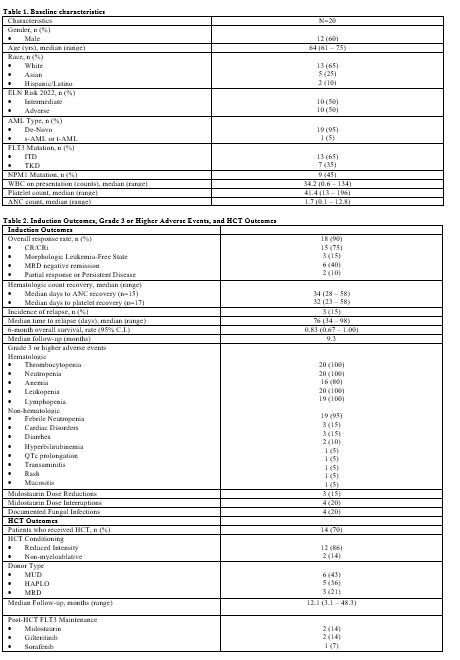Background: Mutations in FLT3 (FLT3m), either internal tandem duplication (ITD) or tyrosine kinase domain (TKD) are found in approximately 25% of AML patients. The current standard of care for eligible patients is induction chemotherapy with 7 + 3 regimen with the addition of multikinase inhibitor midostaurin, based on CALGB 10603 which enrolled patients up to 59 years of age (Stone et al; NEJM 2017). Quizartinib recently demonstrated improved overall survival (OS) compared to placebo when combined with standard 7+3 induction in patients up to 75 years of age, although the benefit in patients 60 and above was less clear (Erba et al; Lancet Oncol 2023). We sought to review the clinical outcomes among patients 60 years of age or greater at our institution for who received midostaurin with 7+3 for newly diagnosed (ND) FLT3m AML.
Methods: We retrospectively reviewed 20 patients, 60 years of age or older who received midostaurin in combination with 7+3 (7+3+Mido) for the treatment of ND-FLT3m AML. Response criteria of CR (complete remission) and CR without hematological recovery (CRi) were defined per standard International Working Group (IWG) AML response criteria. The primary endpoint was defined as composite CR rate (cCR: defined as patients achieving CR +CRi). Minimal residual disease (MRD) assessment was done on post-induction bone marrow aspirate using multiparametric flow cytometric assessment. The secondary endpoints were OS, leukemia-free survival (LFS) among patients with CR/Cri and proportion of patients who underwent subsequent allogeneic hematopoietic cell transplant (alloHCT).
Results: Patients' demographic, cytogenetic and molecular features are summarized in Table 1, briefly, the median age was 64 (range 61-75), males (n=12, 60%), de novo AML (n=19, 95%), FLT3 ITD (n=13, 65%), FLT3 TKD (n=7, 35%). The most common consolidation regimen was high dose cytarabine (HiDAC) in combination with midostaurin (n=5, 25%). Grade 3 or higher hematologic toxicity was uniformly seen and the most common grade 3 or higher non-hematologic toxicities were neutropenic fever (19/20; 95%), cardiac disorders (3/20; 15%), and diarrhea (3/20; 15%). Dose reductions/interruption of midostaurin was required in 35% patients (n=7) and one patient died due to induction related mortality.
7+3+Mido yielded an overall response rate of 90% (18/20), with cCR noted in 75% (15/20) and MLFS seen in 15% (3/20) patients. MRD negative remission was documented in 40% (6/15) patients treated (table 2). The median follow up for the entire cohort was 9.3 months and overall survival at 6 months was 70% (14/20). The majority of patients, 70% (14/20) subsequently underwent alloHCT from matched or haploidentical donor. Reduced intensity conditioning (n=12/14; 86%) and GVHD prophylaxis with tacrolimus/ sirolimus prophylaxis (n=8; 57%) was commonly used in patients undergoing alloHCT. Six patients did not proceed to alloHCT due to death (n=4, one each due to sepsis, disease progression, infection, or intracranial bleed), comorbid conditions (n=1) or short follow up. The median OS for non HCT group was 2.3 months (range: 0.6-6.5). Detailed HCT outcomes data was available subset of patients at last data cut off (9/14; 65%). The Median age of patients undergoing HCT was 65 years (range: 62-76). The median KPS and HCT-CI for these patients was 90% (range :80-90%) and 1.5(range: 0-5) respectively. The majority of patients underwent alloHCT in CR-1(90%), all using PBSC graft from donor. The median duration of follow-up from transplant to last contact or death in the nine evaluable patients was 12.1 months. Median OS and leukemia free survival was not reached and 1-year GRFS was 50% (range:14-79%). Five patients (36%) patients received post-transplant FLT3 maintenance with the most common agents being midostaurin (n=2) and gilteritinib (n=2).
Conclusion: The addition of midostaurin to intensive 7+3 chemotherapy induction for ND FLT3m AML is feasible and well tolerated in older AML patients. The combination results in high remission rates and the majority of patients are able to proceed to alloHCT.
Disclosures
Aribi:Seagen: Consultancy; Kite, a Gilead Company: Consultancy. Aldoss:Takeda: Consultancy; Sobi: Consultancy; KiTE: Consultancy; Jazz: Consultancy; Pfizer: Consultancy; Amgen: Consultancy, Honoraria. Sandhu:Autolus Therapeutics: Consultancy; City of Hope Medical Center: Current Employment. Al Malki:Tscan: Consultancy. Pullarkat:Amgen: Consultancy, Speakers Bureau; Servier: Consultancy, Speakers Bureau; Pfizer: Consultancy, Speakers Bureau; Novartis: Consultancy, Speakers Bureau; Jazz Pharmaceuticals: Consultancy, Speakers Bureau; Genentech: Consultancy, Speakers Bureau; AbbVie: Consultancy, Speakers Bureau. Becker:GPCR Therapeutics: Research Funding; Accordant Health Services: Membership on an entity's Board of Directors or advisory committees; Pfizer: Research Funding; Glycomimetics: Research Funding. Nakamura:NCTN Lymphoma Steering Committee: Membership on an entity's Board of Directors or advisory committees; Mt. Sinai: Other: Acute GVHD; International Consortium: Other: consortium chair; BMT CTN Steering Committee: Membership on an entity's Board of Directors or advisory committees; Omeros: Consultancy; Jazz Pharmaceuticals: Consultancy, Other: research collaboration; Sanofi: Consultancy; Blue Bird: Consultancy; Napajen: Consultancy; Leukemia & Lymphoma Society: Other: grant reviewer; Miyarisan: Research Funding; NCCN: Other: guideline panel for HCT. Stein:Sanofi: Current Employment, Current holder of stock options in a privately-held company. Marcucci:Ostentus Therapeutics: Current equity holder in private company, Research Funding. Artz:Abbvie: Consultancy; Magenta Therapeutics: Other: Advisory Board; Astra Zeneca: Other: Advisory Board; Radiology Partner: Current equity holder in private company, Other: Spouse equity interest. Koller:NOVARTIS: Consultancy, Membership on an entity's Board of Directors or advisory committees, Speakers Bureau; treadwell therapuetics: Consultancy, Other: safety review committee; takeda: Consultancy, Speakers Bureau. Salhotra:Gilead: Research Funding; Kura Oncology: Research Funding; Jazz Pharma: Research Funding; Rigel Pharma: Research Funding; Sobi: Membership on an entity's Board of Directors or advisory committees; Sanofi: Speakers Bureau; OrcaBio: Research Funding; BMS: Research Funding.


